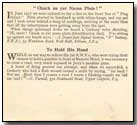Memoirs & Diaries - The Best 500 Cockney War Stories - "Chuck Us Yer Name Plate!" and Other Stories
 Published in London
in 1921, The Best 500 Cockney War Stories
comprised, in the words of its newspaper publisher (The London Evening
News) "a remembering and retelling of those war days when laughter
sometimes saved men's reason".
Published in London
in 1921, The Best 500 Cockney War Stories
comprised, in the words of its newspaper publisher (The London Evening
News) "a remembering and retelling of those war days when laughter
sometimes saved men's reason".
The collection of short memoirs, some 500 in total, is divided into five categories - Action, Lull, Hospital, High Seas and Here and There. This page contains five stories from Action, led by "Chuck Us Yer Name Plate!".
Other sections within the collection can be accessed using the sidebar to the right.
"Chuck Us Yer Name Plate!"
In June 1917 we were ordered to lay a line to the front line at "Plug Street." Fritz started to bombard us with whizz-bangs, and my pal and I took cover behind a heap of sandbags, noticing at the same time that all the infantrymen were getting away from the spot.
When things quietened down we heard a Cockney voice shouting, "Hi, mate! Chuck us yer name plate (identification disc). Y're sitting up against our bomb store."
S. Doust (late Signal Section, "F" Battery, R.H.A.), 53 Wendover Road, Well Hall, Eltham, S.E.9
To Hold His Hand
While on our way to relieve the 1st R.W.F.s, who were trying their utmost to hold a position in front of Mametz Wood, it was necessary to cross a road, very much exposed to Jerry's machine guns.
A burst of firing greeted our attempt, and when we succeeded, a Cockney who had a flesh wound caused a smile by saying, "Go back? Not me. Next time I crosses a road I wants a blinking copper ter 'old me 'and?"
G. Furnell, 57a Southwold Road, Upper Clapton, E.9
The New Landlord
During an advance on the Somme in 1916 my company was rushed up to the captured trenches to search the dug-outs and to bring in the prisoners.
My Cockney pal was evidently enjoying himself. As he went from one dug-out to another he was singing: "Orl that I want is lo-ove, Orl that I want is yew."
Entering one dug-out, however, his voice suddenly changed. In the dug-out were three Germans. Showing them the point of his bayonet, the Cockney roared: " Nah, then, aht of it; 'op it. I'm lan'lord 'ere nah."
C. Grimwade, 26 Rotherhithe New Road, Rotherhithe, S.E.16
"Out of Bounds" in the Line
One night in October '14, in the neighbourhood of Herlies, " Ginger," a reservist, was sent out to call in the men of a listening post. Dawn came, but no "Ginger" returned, and as he did not turn up during the day he was given up for lost.
Soon after dusk, however, a very worn and fed-up "Ginger" returned. We gathered that he had suddenly found himself in the German lines, had had a "dust-up," had got away, and had lain out in No Man's Land until dusk allowed him to get back.
The company officer was inclined to be cross with him, and asked him, "But what made you go so far as the enemy position?"
"Ginger" scratched his head, and then replied, "Well, sir, nobody said anyfink to me abaht it being aht o' bahnds."
T.L. Barling (late Royal Fusiliers), 21 Lockhart Street, Bow, E.3
Epic of the Whistling Nine
On May 14, 1917, the 2/2nd Battalion of the London Regiment occupied the support lines in front of Bullecourt. "A" company's position was a thousand yards behind the front line trenches. At 2 p.m. the enemy began to subject the whole area to an intense bombardment which lasted more than thirteen hours.
In the middle of the bombardment (which was described by the G.O.C.-in-Chief as "the most intense bombardment British troops had had to withstand"), No. 3 platoon of "A" company was ordered to proceed to the front line with bombs for the battalion holding it. The platoon consisted of 31 N.C.O.s and men and one officer.
The only means of communication between the support and front lines was a trench of an average depth of two feet. Along this trench the platoon proceeded, carrying between them forty boxes of Mills bombs.
Every few yards there were deep shell holes to cross; tangled telephone wires tripped the men; M.G. bullets swept across the trench, and heavy shells obtained direct hits frequently, while shrapnel burst overhead without cessation.
A man was hit every few minutes; those nearest him rendered what aid was possible, unless he was already dead; his bombs were carried on by another.
Of the thirty-one who started, twenty-one were killed or wounded; the remainder, having taken an hour and a half to cover the 1,000 yards, reached the front line with the forty boxes of bombs intact.
They were ordered to remain, and thus found themselves assisting in repulsing an attack made by the 3rd Lehr Regiment of Prussian Guards, and two of the men succeeded in wounding and capturing the commanding officer of the attacking regiment.
Of the ten N.C.O.s and men who were left, a lance-corporal was blown to pieces in the trench; the remainder stayed in the front line until they were relieved four days later. On their way back, through Vaux Vraucourt, they picked clusters of May blossom, and with these in their equipment and rifle barrels, marched into the transport lines whistling.
Captain, London Regiment
Next - Tale Of A Cook And A Crump and four other stories
Both British and German fleets had around 45 submarines available at the time of the Battle of Jutland, but none were put to use.
- Did you know?
